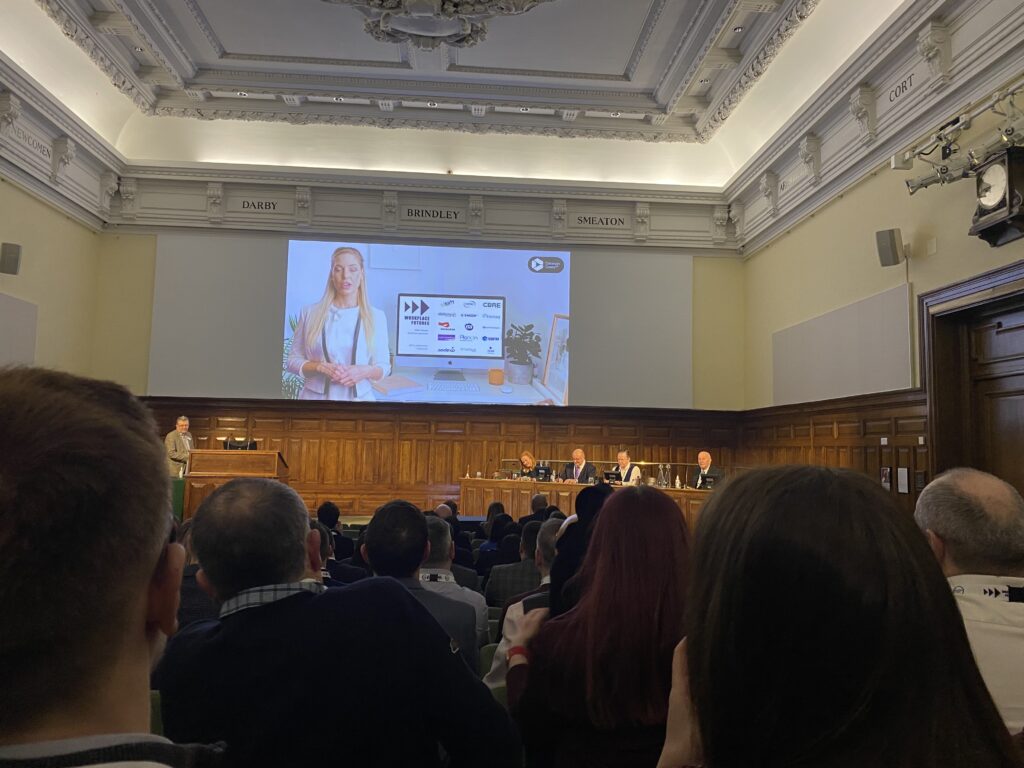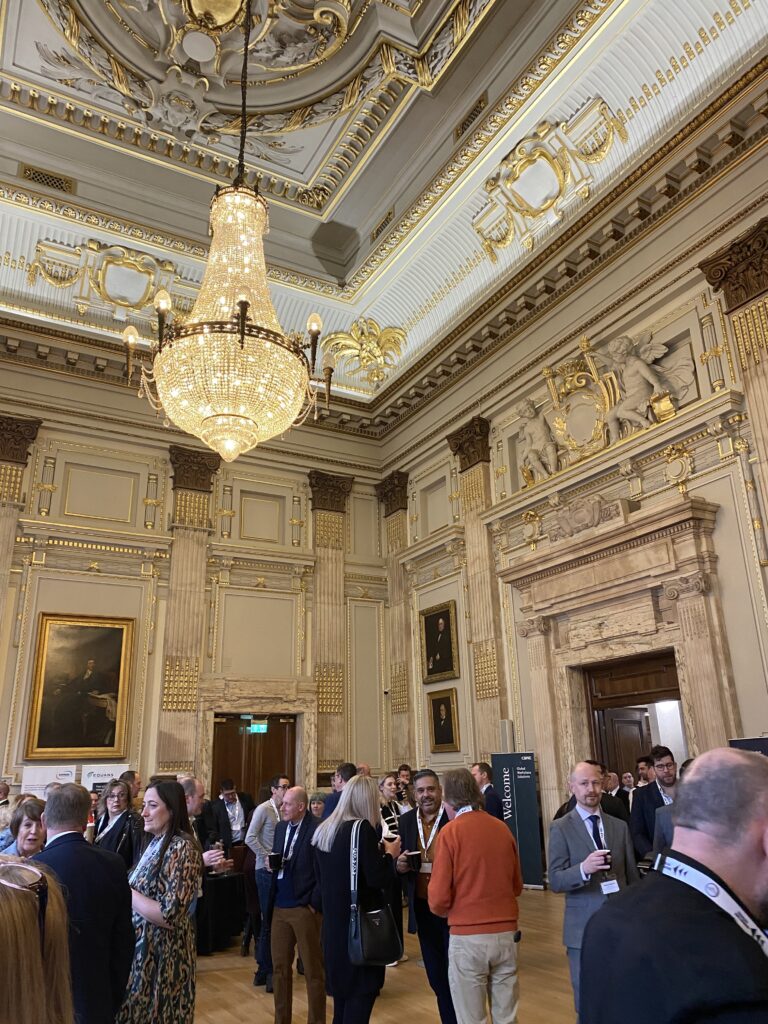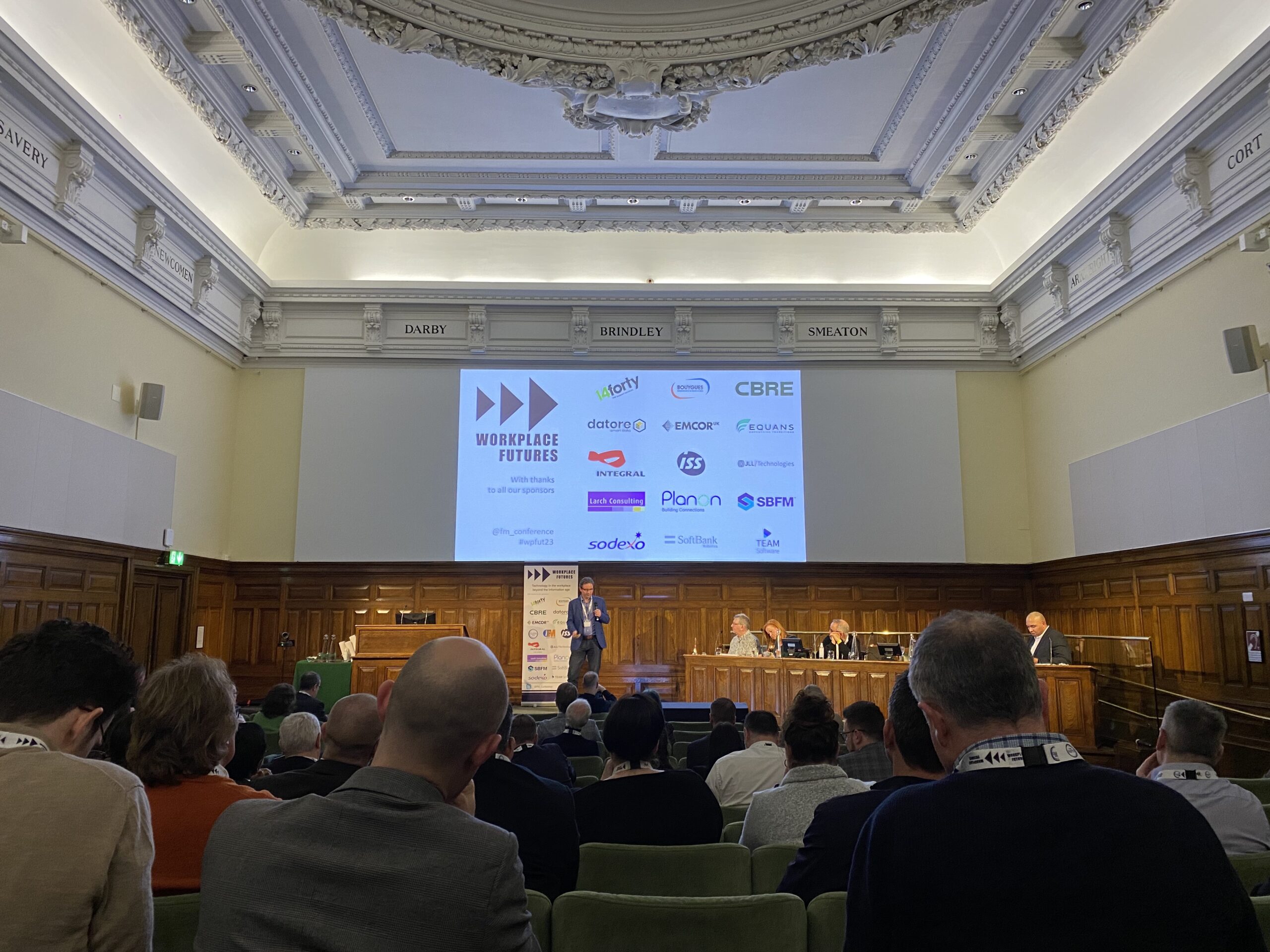The 2023 Workplace Futures conference returned with an air of comfortable normality, as in-person conferences have become the new norm, again. Martin Pickard, fondly known as “the FM guru”, chaired this year’s event, along with his new co-host 7-of-9, an AI-powered assistant that introduced us to the day ahead. The conference welcomed a live audience as well as online delegates. Considering the theme, it was a very fitting start to the day.

Technology and data: a match made in heaven
The relationship between people and technology was a core topic throughout the day. In the first keynote of the day, Lionel Prodgers of Agents4FM took us through the technology of the eras and where it has brought us today, as well as its relation and impact on the FM timeline. Nigel Warrick at Cadline reminded us that 95.5% of captured data in the FM industry goes unused. He highlighted the different technology available today that demonstrates the power of digitalisation and how to capture the best data. Graham Perry of Datore echoed that ‘data is the new oil’ but like oil, it is only of value to us when we refine it.
The everchanging workplace…
The conversation then turned to how technology impacts the workplace. Peter Ankerstjerne of Planon began by highlighting the workplace experience in the hybrid reality. Our workplace is situationally determined, he said, and therefore our link between the physical and the digital workplace is beginning to blur. He concluded that technology is part of the answer to the future workplace requirements, but not its entirety. Simi Gandhi-Whitaker argued that we need to ask what problem we are trying to solve before introducing every single new piece of technology we can get our hands on to try and plug a hole. Otherwise, you can find yourself wondering if these pieces of technology are productive tools, or just toys?
Miquel Vidal Trilla, head of AR at CBRE, offered a more tech-forward perspective as he discussed the industrial metaverse and augmented future of facilities management, including remote support, remote inspections, and immersive learning. I found it surprising that Trilla did not mention the environmental impacts of the metaverse. A recent study identified that training just one AI model for the metaverse could generate five times the volume of greenhouse gases emitted by a car in its lifetime. As much as the use of VR will lower the amount of necessary corporate travel, therefore decreasing pollution, as Trilla discussed, the data suggests the two are not mutually exclusive.
Workplace consultant and author Simone Fenton-Jarvis wrapped up the workplace theme by offering the antithesis of the previous speakers, arguing that the future is all about people. Technology is part of the jigsaw that makes up the “why” of the workplace, but we were reminded not to forget the human element as our industry continues to be full of people.

What does change look like?
We returned from lunch to a wakeup call from Tim Oldman, CEO of Leesman, that the office needs to fight back if it wants to survive. It must offer significantly better benefits than the comforts of the home office. With many businesses set to reduce their office real estate, the future is going to look like less space, but what remains will – or should be high quality space. The speakers following the afternoon’s keynote discussed what we can do to create this quality space.
Shane Betts, Alan Epps and David Bownass of Integral gave the attendees a Q&A-style presentation, discussing how 80% of our current real estate that will be used in 2050 already exists, and therefore how important retrofitting our existing buildings to make them smart will be in the crucial race to net zero. Peter Rigo, CEO of Flowspace, and Claire Callan, smart places associate director of WSP, discussed the importance of considering behaviour in the office and implementing the right technology to reflect and support that behaviour, such as having different heating set points on emptier office days, therefore saving energy and money.
Implementation of future-ready technology
To conclude the day, Marcus Sontheimer from ISS Group discussed the creation of a high-tech future in facilities management, emphasizing the importance of building a digital ecosystem rather than a one-size-fits-all approach. Harpreet Cheema from Sodexo spoke about workplace solutions to enhance employee experience and how technology can be an enabler to support continuity and optimize workplace experiences. Matt Chapman and Charlotte Coles-Morris from SBFM showcased their service management app and how it benefits clients, operative staff managers, and frontline colleagues.
Stefano Bensi from Softbank Robotics, the winner of the i-FM Technology award, spoke about how FM in the workplace will change and how technology can help address the challenges in the FM sector, including competition, low margins, and recruitment problems. We need to be inspired with technology instead of fearful, he argued.
The conference demonstrated that the future is certainly looking techy, that’s for sure. The impending need to embrace new technologies and enter this new era was a key message that came across with all the speakers, otherwise you risk being left behind. Technology is just beginning to rear its head on the possibilities it can bring to the FM industry, offering an exciting time to be a part of the innovation. However, it should be said that the potential for new technology can only be realised if it is used in a way that suits the people-first prerogative.
Check out our summary from last years conference here








